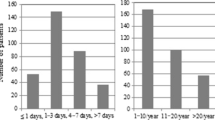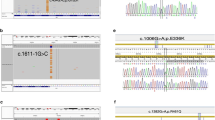Abstract
Introduction
Familial Mediterranean fever (FMF) is an autosomal recessive disease characterized by recurrent self-limiting fever, peritonitis, arthritis, and erysipelas-like-erythema, common among ethnic groups such as Turkish, Armenian, Arab, and Jewish. The disease is caused by mutations in the MEFV gene encoding the Pyrin. This study examines the genotypes of FMF patients from Amasya, Turkey.
Method
According to the Tel Hashomer criteria, one thousand five hundred seventy patients (871 female, 699 male, mean age 21.2 ± 15.5 years) living in Amasya Province and the surroundings were screened for sequence variants in the entire MEFV gene. Besides, mutation types and alleles were evaluated with clinical findings.
Results
MEFV mutations and polymorphisms were found in 1413 of the 1570 patients (90%). Among these patients, 5 (0.3%) were double homozygous, 152 (9.7%) were homozygous, 373 (23.8%) were double heterozygous, and 882 (56.2%) were heterozygous. The most frequent genotype was R202Q (960, 43.5%) followed by M694V (n = 412, 18.7%), E148Q (n = 321, 14.6%), and M680I (n = 200, 9.1%). The most common clinical symptoms were abdominal pain (96.4%) and fever (91.3%).
Conclusions
The fact that the R202Q genotype, which is compatible with the known FMF clinic, is frequently seen shows that it should be included in routine molecular screenings of the patients. Functional studies of the R202Q variant pyrin protein should be performed to understand FMF better. Finally, it is unclear whether the R202Q genotype might be regarded as a mutation while being approved as a polymorphism in the inFevers database.
Similar content being viewed by others
Data availability
Our dataset has been added to the supplementary material section.
References
Rigante D (2018) The broad-ranging panorama of systemic autoinflammatory disorders with a specific focus on acute painful symptoms and hematologic manifestations in children. Mediterr J Hematol Infect Dis 10(1):e2018067
Sönmez HE, Batu ED, Özen S (2016) Familial Mediterranean fever: current perspectives. J Inflamm Res 9:13–20
Sarı İ, Birlik M, Kasifoğlu T (2014) Familial Mediterranean fever: an updated review. Eur J Rheumatol 1(1):21–33
Sohar E, Gafni J, Pras M, Heller H (1967) Familial Mediterranean fever. A survey of 470 cases and review of the literature. Am J Med 43(2):227–53
Bonyadi M, Esmaeili M, Karimi A, Dastgiri S (2010) Common Mediterranean fever gene mutations in the Azeri Turkish population of Iran. Genet Test Mol Biomarkers 14(1):149–151
Fietta P (2004) Autoinflammatory diseases: the hereditary periodic fever syndromes. Acta Biomed 75(2):92–99
Tunca M, Akar S, Onen F et al (2005) Familial Mediterranean fever (FMF) in Türkiye: results of a nationwide multicenter study. Medicine (Baltimore) 84(1):1–11
Heller H, Kariv J, Sherf L, Sohar E (1955) Familial Mediterranean fever. Harefuah 48(5):91–94
French FM, French FMF Consortium (1997) A candidate gene for familial Mediterranean fever. Nat Genet 17(1):25–31
The International FMF Consortium (1997) Ancient missense mutations in a new member of the RoRet gene family are likely to cause familial Mediterranean fever. Cell 90(4):797–807
Milhavet F, Cuisset L, Hoffman HM et al (2008) The infevers autoinflammatory mutation online registry: update with new genes and functions. Hum Mutat 29(6):803–808
Touitou I, Milhavet F, Cuisset L (2014) Response to Li and Zhang: infevers, a human gene mutation database for autoinflammatory diseases including disseminated superficial actinic porokeratosis. J Dermatol Sci 75(3):208–209
Centola M, Wood G, Frucht DM et al (2000) The gene for familial Mediterranean fever, MEFV, is expressed in early leukocyte development and is regulated in response to inflammatory mediators. Blood 95(10):3223–3231
Drenth JP, van der Meer JW (2001) Hereditary periodic fever. N Engl J Med 345(24):1748–1757
Booth DR, Gillmore JD, Lachmann HJ et al (2000) The genetic basis of autosomal dominant familial Mediterranean fever. QJM 93(4):217–221
Campbell L, Raheem I, Malemud CJ, Askari AD (2016) The relationship between NALP3 and autoinflammatory syndromes. Int J Mol Sci 17(5):725. https://doi.org/10.3390/ijms17050725
Papin S, Cuenin S, Agostini L et al (2007) The SPRY domain of pyrin, mutated in familial Mediterranean fever patients, interacts with inflammasome components and inhibits proIL-1beta processing. Cell Death Differ 14(8):1457–1466
Ait-Idir D, Djerdjouri B (2020) Differential mutational profiles of familial Mediterranean fever in North Africa. Ann Hum Genet 84(6):423–430
Schnappauf O, Chae JJ, Kastner DL, Aksentijevich I (2019) The pyrin inflammasome in health and disease. Front Immunol 10:1745
Dundar M, Emirogullari EF, Kiraz A et al (2011) Common familial Mediterranean fever gene mutations in a Turkish cohort. Mol Biol Rep 38(8):5065–5069
Livneh A, Langevitz P, Zemer D et al (1997) Criteria for the diagnosis of familial Mediterranean fever. Arthritis Rheum 40(10):1879–1885
Ben-Chetrit E, Touitou I (2009) Familial mediterranean Fever in the world. Arthritis Rheum 61(10):1447–1453
Touitou I (2001) The spectrum of familial Mediterranean fever (FMF) mutations. Eur J Hum Genet 9(7):473–83. Available from: https://doi.org/10.1038/SJ.ejhg.5200658
Mansour AR, El-Shayeb A, El Habachi N et al (2019) Molecular patterns of MEFV gene mutations in Egyptian patients with Familial Mediterranean Fever: a retrospective cohort study. Int J Inflamm 2019:2578760
Mohammadnejad L, Farajnia S (2013) Mediterranean Fever gene analysis in the azeri turk population with familial mediterranean Fever: evidence for new mutations associated with disease. Cell J 15(2):152–159
Kehribar DY, Özgen M (2020) The importance of Mediterranean fever gene in familial Mediterranean fever. Eur J Rheumatol 7(4):173–176
Yilmaz E, Ozen S, Balci B et al (2001) Mutation frequency of Familial Mediterranean Fever and evidence for a high carrier rate in the Turkish population. Eur J Hum Genet 9(7):553–555
Arpacı A, Doğan S, Erdoğan HF et al (2021) Presentation of a new mutation in FMF and evaluating the frequency of the MEFV gene mutation distribution in our region with clinical findings. Mol Biol Rep 48(3):2025–2033
Comak E, Akman S, Koyun M et al (2014) Clinical evaluation of R202Q alteration of MEFV genes in Turkish children. Clin Rheumatol 33(12):1765–1771
Kilinc M, Ganiyusufoglu E, Sager H et al (2016) The report of sequence analysis on familial Mediterranean fever gene (MEFV) in South-eastern Mediterranean region (Kahramanmaraş) of Türkiye. Rheumatol Int 36(1):25–31
Cekin N, Akyurek ME, Pinarbasi E, Ozen F (2017) MEFV mutations and their relation to major clinical symptoms of Familial Mediterranean Fever. Gene 626:9–13. https://doi.org/10.1016/j.gene.2017.05.013
Doğan HO, Koca Y, Erden G et al (2012) A retrospective study will evaluate MEFV mutation frequency in Turkish familial Mediterranean fever suspected patients and gender correlation. Mol Biol Rep 39(5):6193–6196
Öztürk A, Özçakar B, Ekim M, Akar N (2008) Is MEFVGene Arg202Gln (605 G> A) a disease-causing mutation? Turk J Med Sci 38(3):205–208
Bodur H, Yurdakul FG, Çay HF et al (2020) Familial mediterranean fever: assessment of clinical manifestations, pregnancy, genetic mutational analyses, and disease severity in a national cohort. Rheumatol Int 40(1):29–40
Sönmezgöz E, Özer S, Gül A et al (2019) Clinical and demographic evaluation according to MEFV genes in patients with Familial Mediterranean Fever. Biochem Genet 57(2):289–300
Kliegman RM, St Geme JW, Schor NF (2016) Hereditary periodic fever syndromes and other systemic autoinflammatory diseases. Nelson textbook of pediatrics. Philadelphia: Elsevier, pp 1193–8
Shohat M, Halpern GJ (2011) Familial Mediterranean fever—a review. Genet Med 13(6):487–498
Author information
Authors and Affiliations
Corresponding author
Ethics declarations
Conflict of interest
The authors declare no competing interests.
Additional information
Publisher's Note
Springer Nature remains neutral with regard to jurisdictional claims in published maps and institutional affiliations.
Key points
• The R202Q genotype predominated in the Central Black Sea area of Turkey.
• Functional studies of the R202Q variant pyrin protein should be performed to elucidate its role in FMF fully.
• Whether the R202Q genotype can be considered a mutation will be clarified as a result of further research.
Rights and permissions
Springer Nature or its licensor (e.g. a society or other partner) holds exclusive rights to this article under a publishing agreement with the author(s) or other rightsholder(s); author self-archiving of the accepted manuscript version of this article is solely governed by the terms of such publishing agreement and applicable law.
About this article
Cite this article
Çapraz, M., Düz, M.E. R202Q prevalence in clinically diagnosed Familial Mediterranean Fever patients: 9 years of data analysis from 1570 patients living Central Black Sea region, Turkey. Ir J Med Sci 192, 2273–2278 (2023). https://doi.org/10.1007/s11845-022-03233-1
Received:
Accepted:
Published:
Issue Date:
DOI: https://doi.org/10.1007/s11845-022-03233-1




